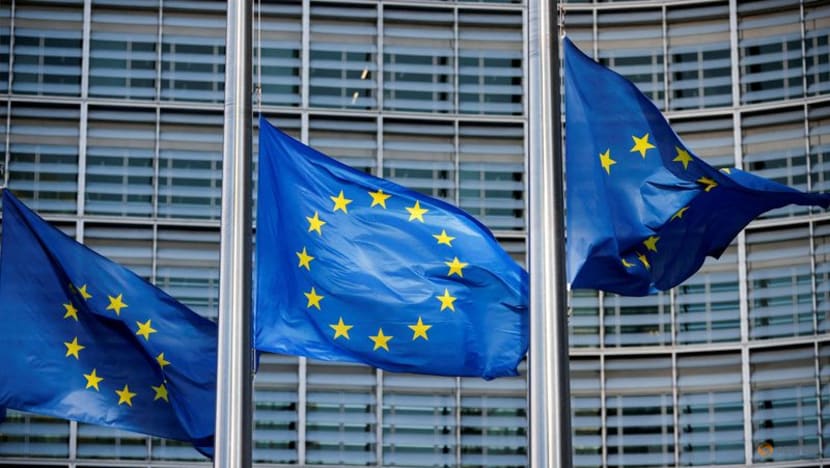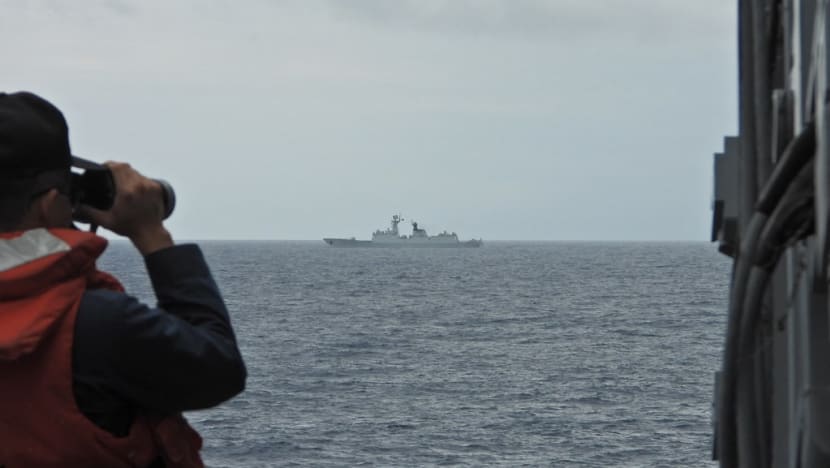Absence of US and China at EU forum means Indo-Pacific countries won’t be ‘pressured to choose sides’: Observers
China has never been invited to the gathering, while the United States, which attended last year's iteration, did not receive an invitation this year.

FILE PHOTO: European Union flags fly outside the European Commission headquarters in Brussels, Belgium, March 1, 2023. (REUTERS/Johanna Geron)

This audio is generated by an AI tool.
The exclusion of the world’s top two superpowers, China and the United States, from a European Union summit on the Indo Pacific is likely a “diplomatic move” to allow other countries to pursue their own interests without being forced to choose sides, said observers.
The EU will host its third Indo-Pacific forum in Brussels on Friday (Feb 2). China has never been invited to the gathering of foreign ministers, while the US, which participated in last year's iteration, did not receive an invitation this year.
“This is Europe treading a very careful line, and trying to make sure that the countries they are inviting from Asia (and) from the Indo-Pacific region don't feel like they're being put into a corner and being asked to choose sides between the US and China,” said Mr Chris Humphrey, executive director of the EU-ASEAN Business Council.
“This is probably quite a smart diplomatic move by Europe. Europe believes it's big enough and strong enough, that it can play a significant role in the region.”
RESHUFFLING OF GLOBAL ORDER
On the importance of China, Mr Humphrey said: “Europe doesn't ignore China. Europe does engage with China. But it does it in a very careful and very measured way.”
Dr Pushan Dutt, professor of economics and political science at INSEAD, added: “What we are witnessing right now is a reshuffling of the global order. So countries are either lining up on the US side or the Chinese side.
“Some are doing it voluntarily, some are being forced to, but there are a bunch of countries in Europe and Asia who actually want to pursue their own interests, aligned with their own values, without overbearing pressure from either the US or China.”
Another reason could be that the EU is concerned about the outcome of the upcoming US presidential election, he told CNA’s Asia First.
“So they can see a scenario where (former US president) Donald Trump comes into power, pulls out of the (North Atlantic Treaty Organization), (and) starts a trade war. In that scenario, they bear a lot of risks, so they're trying to create different aligned structures with different parts of the world.”
On the agenda at the Indo-Pacific forum are security cooperation, trade and climate change, among other issues.
Security concerns involving China will also be a central theme, with the possibility of escalated tensions in the Taiwan Strait and South China Sea in focus.
There are various ongoing conflicts, including the Israel-Hamas war and Russia’s invasion of Ukraine, that have been a “wake-up call” for Europe, said Dr Dutt.
“But the conflict that they're most worried about, of course, is the slow simmering potential conflict over Taiwan.”

STEADY PROGRESS MADE BY EU, ASEAN
EU ministers will hold a separate ministerial meeting with their Association of Southeast Asian Nations (ASEAN) counterparts on Friday.
“I think the ASEAN side would like to see a lot more on (trade, investment and economic support). The EU will probably be pushing more on its green agenda,” said Mr Humphrey.
“The good thing is they're meeting. They're meeting and they're talking, and that can only help the understanding on both sides.”
Within ASEAN and the EU, countries are divided over the Israel-Hamas war, said Mr Humphrey.
“The war in the Middle East is worrisome for all of us, the chances that it can overflow from the Israel-Hamas conflict into a broader conflict,” he told CNA938.
“Everyone has an interest to try and make sure that does not happen, and it doesn't really matter which side you are supportive or not supportive of.
“No one wants to see an escalation, and that's where meetings like this can help.”
He highlighted the good and steady progress made by the two blocs over the years.
“The EU is by far the largest aid and development supporter for ASEAN, with huge amounts of money in a number of different projects covering different areas on economic issues, environmental issues, social cultural issues, and on the political security side. So there has been work,” he said.
Related:
TAKING STEPS TO TACKLE PRESSING CONCERNS
Observers believe the regional groupings can build on their cooperation through the meeting, and establish benchmarks and working groups to tackle pressing issues.
“With the European Union, you always have to recognise the fact that it's an agglomeration of countries which have different levels of development, different histories, languages, cultures, and even different interests,” said Dr Dutt.
“ASEAN is also an agglomeration of countries where the interests sort of don't underline. Just to give a parallel, ASEAN countries are struggling with what to do with Myanmar and its junta.”
He added that Europe, however, has experience in slowly getting to their objectives.
“They're more patient, they recognise the interests of different countries. This is their competitive advantage,” he noted.
“So therefore, in the longer term, I would be optimistic that they can get to more trade treaties, investment treaties, (and) tackling climate change while negotiating with countries in this region.”
When asked about the likely outcomes of the Indo-Pacific forum, Dr Dutt said: “We should not expect big trade agreements between these regional agglomerations, but sort of small steps.
“So one way to think of this is that this is not a sprint, that this is a marathon, and therefore this requires long-term vision and long-term commitment, especially of political capital and financial resources.”














